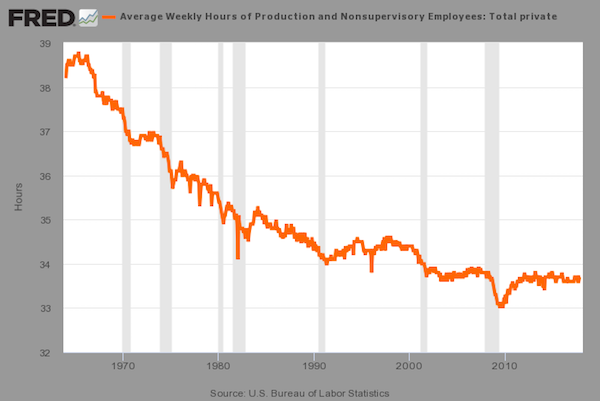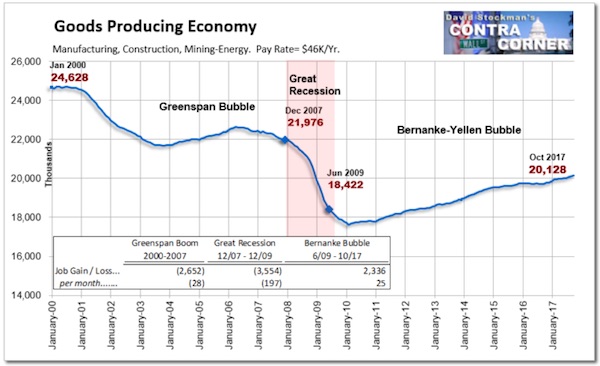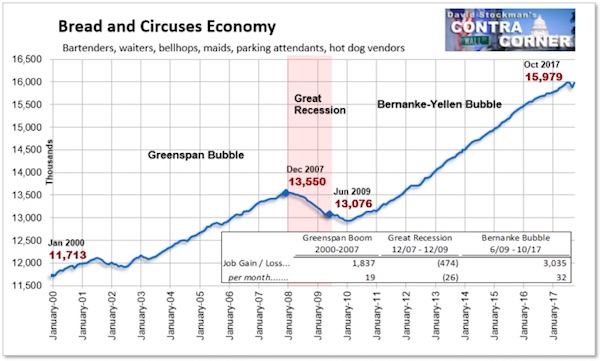
Robert Frank Motorama, Los Angeles 1956

Politics is the entertainment division of the military industrial complex.
-Frank Zappa
The decline in quality of jobs -and compensation- is as horrible as the jobs reports’ attempts at hiding that decline.
• Peak Fantasy Time (David Stockman)
If you want to know why both Wall Street and Washington are so delusional about America’s baleful economic predicament, just consider this morsel from today’s Wall Street Journal on the purportedly awesome November jobs report. “Wages rose just 2.5% from a year earlier in November—near the same lackluster pace maintained since late 2015, despite a much lower unemployment rate. But in a positive sign for Americans’ incomes, the average work week increased by about 6 minutes to 34.5 hours in November…. November marked the 86th straight month employers added to payrolls.” Whoopee! Six whole minutes added to a work week that has been shrinking for decades owing to the relentlessly deteriorating quality mix of the “jobs” counted by the BLS establishment survey.
In fact, even by that dubious measure, the work week is still shorter than it was at the December 2007 pre-crisis peak (33.8) and well below its 2000 peak level. The reason isn’t hard to figure: The US economy is generating fewer and fewer goods producing jobs where the work week averages 40.5 hours and weekly pay equates to $58,400 annually and far more bar, hotel and restaurant jobs, where the work week averages just 26.1 hours and weekly pay equates to only $21,000 annually. In other words, the ballyhoed headline averages are essentially meaningless noise because the BLS counts all jobs equal – that is, a 10-hour per week gig at the minimum wage at McDonald’s weighs the same as a 45 hour per week (with overtime) job at the Caterpillar plant in Peoria that pays $80,000 annually in wages and benefits.

In fact, what has been the weakest expansion in history by far may now be finally running out of gas. During the last several weeks the pace of US treasury payroll tax collections has actually dropped sharply – and it is ultimately Uncle Sam’s collection box which gives the most accurate, concurrent reading on the state of the US economy. Some 20 million employers do not tend to send in withholding receipts for the kind of phantom seasonally maladjusted, imputed and trend-modeled jobs which populate the BLS reports.
Yet we we are not close to having recovered the 4.3 million goods producing jobs lost in the Great Recession; 40% of them are still AWOL – meaning they are not likely to be recovered before the next recession hits. Stated differently, the US economy has been shedding high paying goods producing jobs ever since they peaked at 25 million way back in 1980. Indeed, we are still not even close to the 24.6 million figure which was posted at the turn of the century.

By contrast, the count of leisure and hospitality jobs( bars, hotels and restaurants), or what we have dubbed the “Bread and Circuses Economy” keeps growing steadily, thereby filling up the empty space where good jobs have vacated the BLS headline total. Thus, when goods-producing jobs peaked at 25 million back in 1980, there were only 6.7 million jobs in leisure and hospitality. Today that sector employs 16.0 million part-time, low-pay workers..


“.. the Fed has erroneously predicted 2% inflation for 66 months and continues to tell us that the low levels of inflation are “transitory.“
• Deflation Remains Biggest Threat As Lofty Stock Markets Head Into 2018 (F.)
In the two weeks running up to the passage of the Senate’s version of the tax bill, the equity markets moved significantly depending on how any particular Republican senator intended on voting. Then, when the Senate finally passed the bill on the next business day, markets made new intra-day record highs, but then reversed course. Given the current sky-high market valuation levels, the tax benefits are already priced in. Economist David Rosenberg examined market reaction to the five major tax bills of the last 70 years. He found that, on average, the S&P 500 rises 14.3% (median 18.9%) in the year leading up to the passage of the tax legislation. In the year following, on average, the index falls 7.5% (median 13.1%). It could be he is on to something.
If it has been historically easy money that has propelled the U.S. and every other major stock market to record heights over the past few years, then it is noteworthy that the last 12 moves from the world’s central banks have been tightening moves. We know that the Fed is certain to tighten next week at its December 12-13 meeting. This, despite the fact that the Fed’s governing board is deeply divided on the outlook for interest rates and inflation. According to their own minutes, some Fed-governing members continue to hold to the academic view that the Phillips curve (i.e., inflation always rises when the unemployment rate is low) is alive and well. Under this view, inflation is just around the corner and the Fed had better be pre-emptive, lest inflation get ahead of them.
The other view is that today’s economy exhibits behaviors that are significantly different from those that dominated the 60+ years of post-WWII America, and that inflation is no longer the threat it used to be. In fact, deflation may be a bigger threat, especially given the high and rising debt levels. Regular readers know that I have espoused the latter viewpoint. I have pointed out several times that the Fed has erroneously predicted 2% inflation for 66 months and continues to tell us that the low levels of inflation are “transitory.” Fed Chair-Elect Powell espoused this viewpoint in his confirmation hearing, so, there is not much hope that they Fed will back off.

US, Canada et al don’t want any special treatment for Britain. But that’s not their decision.
• Global Powers Lobby To Stop Special Brexit Deal For UK (G.)
Theresa May’s hopes of securing a unique post-Brexit trade deal with the EU were under threat on Saturday night as Brussels said it was coming under international pressure to deny Britain special treatment. After a week that saw May reach a deal with the EU that will allow Brexit talks to move forward on to future trade relations, EU officials insisted a bespoke deal more favourable to the UK than other non-EU nations was out of the question. One EU source close to the talks said: “We have been approached by a number of [non-member] countries expressing concerns and making it clear that it would constitute a major problem for them if suddenly the UK were to get better terms than they get.”
The official said that once the UK is out of the single market and customs union in March 2019, there could be no replication of the terms of the current trading relationship, or anything close to it, and no special treatment. “It is not just an indication of some strange rigid principle. It is because things won’t work,” he said. “First and foremost we need to stick to this balance of rights and obligations, otherwise we will be undermining our own customs union and single market. Second, we cannot upset relations with other third countries,” the official said. “If we were to give the UK a very lopsided deal, then the other partners with whom we have been engaging and who entered into balanced agreements would come back and question those agreements.”

Julian Assange on Twitter: “Is the fake news story about @WikiLeaks yesterday the worst since Iraq? It’s a serious question. Three outlets, CNN, NBC and ABC all independently “confirmed” the same false information. Has there previously been a serious triple origin fake news story? i.e not just re-reporting.”
• The US Media Yesterday Suffered its Most Humiliating Debacle in Ages (GG)
Friday was one of the most embarrassing days for the U.S. media in quite a long time. The humiliation orgy was kicked off by CNN, with MSNBC and CBS close behind, with countless pundits, commentators and operatives joining the party throughout the day. By the end of the day, it was clear that several of the nation’s largest and most influential news outlets had spread an explosive but completely false news story to millions of people, while refusing to provide any explanation of how it happened. The spectacle began on Friday morning at 11:00 am EST, when the Most Trusted Name in News™ spent 12 straight minutes on air flamboyantly hyping an exclusive bombshell report that seemed to prove that WikiLeaks, last September, had secretly offered the Trump campaign, even Donald Trump himself, special access to the DNC emails before they were published on the internet.
As CNN sees the world, this would prove collusion between the Trump family and WikiLeaks and, more importantly, between Trump and Russia, since the U.S. intelligence community regards WikiLeaks as an “arm of Russian intelligence,” and therefore, so does the U.S. media. This entire revelation was based on an email which CNN strongly implied it had exclusively obtained and had in its possession. The email was sent by someone named “Michael J. Erickson” – someone nobody had heard of previously and whom CNN could not identify – to Donald Trump, Jr., offering a decryption key and access to DNC emails that WikiLeaks had “uploaded.”

Steve is busy introducing economics to energy. Another thing the entire field entirely overlooked.
• Principles of Political Economy: The Opening Lines (Steve Keen)
Labor without Energy is a Corpse; Capital without Energy is a Statue
Economics went astray from the very first sentence of Adam Smith’s Wealth of Nations in 1776: “The annual labour of every nation”, Smith asserted, “is the fund which originally supplies it with all the necessaries and conveniences of life which it annually consumes, and which consist always, either in the immediate produce of that labour, or in what is purchased with that produce from other nations.” This paragraph mimicked the structure, and even the cadence (though not the brevity), of the opening sentence of Richard Cantillon’s 1730 treatise Essai sur la Nature du Commerce en Général (which Smith read). However, Smith made one crucial substitution: he asserted that “Labor … is the fund” from which our wealth springs, whereas Cantillon asserted that it was Land:
“Land”, Cantillon began, “is the source or matter from which all wealth is drawn; man’s labor provides the form for its production, and wealth in itself is nothing but the food, conveniences, and pleasures of life.” (21) Both these assertions are strictly false. The true source of the wealth that humanity has generated from production is neither Labor nor Land, but the Energy that humanity’s production systems harness and turn into useful work (now known as “Exergy”). However, Smith’s assertion is irredeemably false, whereas Cantillon’s merely needs generalization to make it consistent with the fundamental laws of the universe known as the Laws of Thermodynamics. These Laws are still poorly known by economists, which in part explains why economic theory has managed to be in conflict with them for so long. Illustrating why this is so, and why it is crucial, will take time, and effort on your part too to understand them (if you do not already).
But the fact that no theory that contradicts them can be taken seriously, was stated eloquently by the physicist Arthur Eddington in his 1928 book for lay readers The Nature of the Physical World: The law that entropy always increases—the second law of thermodynamics—holds, I think, the supreme position among the laws of Nature. If someone points out to you that your pet theory of the universe is in disagreement with Maxwell’s equations—then so much the worse for Maxwell’s equations. If it is found to be contradicted by observations—well, these experimentalists do bungle things sometimes. But if your theory is found to be against the second law of thermodynamics I can give you no hope; there is nothing for it but to collapse in deepest humiliation. (37)

Life in Greece. Every day gets worse.
• Half A Salary, Half A Job, Half A Life (K.)
Two in three Greeks fail to pay their bills on time, mainly because they don’t have the money. Three in 10 private sector workers, meanwhile, work part time and get paid a salary of 407.15 euros a month, on average. The first case puts Greece at the top of the list of EU countries in terms of citizens that don’t keep up with their bills, according to the European Consumer Payment Report 2017, with the main reason being the lack of money. In the rest of Europe, the main causes of delays are simple absentmindedness or forgetfulness. The second case is something entirely different. In one sense, it can be interpreted as a reduction in unemployment, which dropped to 20.5% in September. Basically, unemployment falls as part-time work rises, with 30.6% of employees in the private sector working such jobs.
Is this something to be glad about? Should we welcome it as an improvement in the country’s economy? Flexible forms of labor that bring in a pittance of a salary strengthen the ranks of the nouveau pauvre, but at the same time bring down unemployment – albeit dragging down every index that points to a normal life along with it. This is the new normal. But how can 400 euros a month possibly be considered normal? We are beyond the viral videos of the first months of the crisis, of frenzied officials claiming that children were fainting of hunger at school, of images of people rummaging through trash cans looking for food, of pensioners falling over each other for a bag of free potatoes and other such dramatic scenes, real or contrived, that appeared on screens all over the world, and which the present government is quick to claim no longer exist.
Today, some really “lucky” Greeks are insured and have a daily wage of 51 euros, adding up to 1,193 euros a month. But the majority, the less fortunate – yet still fortunate enough to have a job – need to make do with 400 euros a month. It is a conundrum that requires a good deal of math. This month you’ll pay the water bill but not the electricity, you’ll limit your purchases to the bare essentials and you’ll adapt your diet to your budget. What’s left after that? A constant knot in your stomach that you have to learn to put up with. You won’t faint in the street, but each day will be a struggle. You will die a little bit inside, but this is not a measurable reaction and the indices don’t care. Neither does the government, whose slogan when it was in the opposition was that there are real people behind the data. Now the only number it cares to talk about is the shrinking unemployment rate.[..]
The line that defines normal is constantly being shifted and with it the definition of poverty.

Erdogan was in Greece the past week and tried to stir up as much shit as he could. Refugees remain his main weapon.
• Erdogan, Tsipras Strike Secret Deal On Refugees (K.)
As pressure due to overcrowding continues to build at reception centers for migrants on the islands of the eastern Aegean, Turkish President Recep Tayyip Erdogan accepted a request by Prime Minister Alexis Tsipras that Turkey take back migrants from the Greek mainland as well as the islands, Kathimerini understands. During a joint press conference with Erdogan on Thursday, Tsipras declared that “new measures have been agreed for cooperation in the context of the European Union-Turkey agreement,” referring to a deal signed between Ankara and Brussels in March 2016 to curb human trafficking across the Aegean. Tsipras’s comments spurred much speculation about what those measures might be. It appears that they would involve triggering the return of migrants to Turkey, a process that has largely halted as new arrivals often lodge applications for asylum, a lengthy process.
Thousands of migrants, particularly those deemed to be the most vulnerable such as children, pregnant women and the elderly, have already been transferred from cramped facilities on the islands to the mainland. But conditions remain overcrowded at the island camps amid a constant stream of new arrivals from neighboring Turkey. What remains unclear is whether officials in Brussels have approved the deal; as it stands, it would basically undermine the basis of last year’s EU-Ankara agreement, according to which migrants should remain on the islands until a decision has been reached on their status (whether they are considered to belong to vulnerable groups meriting priority treatment, to be granted asylum etc). In recent comments, Dutch Ambassador in Athens Caspar Veldkamp expressed concerns about the prospects of mass relocations to the mainland if returns are not being made to Turkey, noting that this could undermine the EU-Turkey deal and encourage human smugglers rather than averting them.
For the leftist-led government, however, moving migrants from cramped facilities to mainland camps would appease those in the party concerned about inhumane conditions on the islands. As winter looms, and hundreds of migrants continue to live in tents around the reception centers, Migration Minister Yiannis Mouzalas has conceded that he could not rule out the risk of people dying from hypothermia. In an interview with Der Spiegel that was published on Friday, Mouzalas said that authorities were making preparations to ensure that island camps are ready to deal with plunging temperatures. Everything should be in place by December 15, he said. “The key though is the number of new arrivals,” he said, adding that if there is no large increase in numbers “then we are well prepared.” Authorities might reserve some rooms at local hotels if necessary, he said.

Haven’t heard this one before, and it feels like an ominous sign: “Migration Minister Yiannis Mouzalas told Germany’s Spiegel Online that he cannot guarantee that no one will die in the camps with the onset of winter.”
• Refugee Arrivals in Greece Offset Decongestion Efforts (K.)
The effort to improve the living conditions of refugees and migrants stranded at overcrowded reception centers on the eastern Aegean islands of Lesvos, Chios and Samos by transferring some of them to the mainland will fail to yield the desired result as long as flows from Turkey continue. In its latest report, the UNHCR said that 17,764 people were transferred from the islands to the mainland in the period from July 2016 to November 2017. UNHCR sources clarified, however, that the number of those removed from the islands is significantly higher than the official figure. Many of the people who have completed the necessary procedures or are deemed to be vulnerable, and as such are allowed to depart for the mainland, do so at their own cost, the same sources said.
They also reckoned that in 2016 around 40% of transfers were conducted by the UNHCR but the%age rose to 80% in 2017 after a request by the Migration Policy Ministry. At the same time, however, in the period between early April 2016, when Ankara and Brussels reached a deal to limit migrant flows into Europe, until late November, some 48,600 people arrived in Greece. In November, 3,800 people arrived on the Greek islands from Turkey, while 2,128 asylum seekers were transferred to the mainland in the same month. The Migration Policy Ministry on Saturday dismissed rumors on Chios that there are plans for the immediate removal of some 1,000 people from the Vial hotspot. It said that removals will take place gradually.
Meanwhile, Migration Minister Yiannis Mouzalas told Germany’s Spiegel Online that he cannot guarantee that no one will die in the camps with the onset of winter. “What we can do,” he said, “is try the utmost to prevent death.” Moreover, the German newspaper Bild said that an increasing number of refugees in Greece are trying to get to other European Union countries using forged passports.

There are multiple pieces coming out lately that prove the obvious: once mankind started gathering surpluses, hierarchies developed, and so did inequality.
• Super Rich Shown To Have Grown Out Of Ancient Farming (G.)
To measure relative wealth in a society, the team worked with archaeologists studying 62 different societies in Europe, Asia and North America. Some of these were up to 10,000 years old and included digs in ancient Babylonia, Catalhoyuk (now in Turkey) and Pompeii. Researchers analysed the sizes of houses at these sites and used these as indicators of the variations of wealth that existed there at any one time. “House size gives a very good indication of wealth,” said Smith. This point was backed by Kohler. “We consider house size to be a proxy for wealth.” The figures produced by these analyses provided the team with an indication of a particular society’s wealth. The greater the diversity in house size, the greater the inequality. In turn this disparity was measured using a system based on the Gini coefficient.
“Gini coefficients range from zero for societies in which each person has exactly the same amount of wealth to a society in which a single person owns the resources of an entire society. Such a society would have a Gini coefficient of one,” Kohler said. The team found that ancient farming societies had an inequality with a coefficient of around 0.35. That is a higher level of inequality than the level that is likely to have existed in earlier millennia when humans lived as hunter gatherers and shared many resources. “However, this inequality among these, the first farmers, is an awful lot less than the inequality you find in the US today,” said Kohler. “Here we have a Gini coefficient of around 0.8 today.” In the ancient farms of the New World, inequality stayed more or less the same. However, in Eurasia it started to climb over time until it reached levels of around 0.6 a few thousand years ago. This rise coincides with the introduction of oxen and horses and their exploitation in the ploughing of fields.

More. Monsanto. Mayhem.
• India Gov. Files Suits Against Monsanto et al Over Bollworm Cotton Attack (VoI)
The Maharashtra government on Friday announced that it would file police complaints against seed companies like Monsanto, which supplied seeds of BT Cotton, the crops from which were destroyed in a large-scale bollworm attack. Maharashtra’s Revenue Minister Chandrakant Patil said on Friday more than 70% of the cotton crop in Vidarbha has been destroyed due to the bollworm attack. He added that companies like Monsanto had provided the BT Cotton seeds with the promise that they were immune to attacks by the pest. The Vasantrao Naik Shetkari Swavalamban Mission, a state government body, has estimated that the output of cotton in Maharashtra would fall to 43.10 lakh quintal as compared to 78.61 quintals in December 2016.
The opposition parties are however demanding that the Maharashtra government pay compensation to cotton farmers on the lines of the ongoing farm loan waiver extended to cultivators. The Nationalist Congress Party is demanding that the government provide a compensation of Rs 25,000 per hectare for farmers whose crop has been destroyed in the bollworm attack. NCP leader Dhananjay Munde said his party would hold protests in the cotton-growing areas of Vidarbha to force the government raise compesation to farmers. With the opposition parties likely to paralyse the state legislature during the Winter Session to be held in Nagpur from Monday, Chief Ministre Devendra Fadnavis’s government on Friday asked revenue officials to carry out panchnama of crops destroyed in the bollwork attack. “We are working on a compensation package for farmers,” Patil told reporters.

Politics is the entertainment division of the military industrial complex.
-Frank Zappa









Home › Forums › Debt Rattle December 10 2017